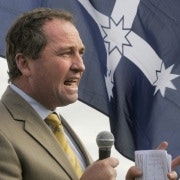Pricing Canberra's double carbon standard
"How many billions have to be spent on these schemes before state and federal governments stop trying to buy the green vote?" demanded the Australian Financial Review yesterday, apropos of the government's decision to close the solar hot water subsidy scheme that was threatening to run over-budget.
It's a good question from the Fin under Michael "more Australian than The Australian" Stutchbury, one worth bearing in mind.
Closing the program drew criticism from the affected sector about the likely impact on jobs. It also elicited criticism that the government was always keen to provide assistance to the heavily unionised automotive sector but somehow lost its enthusiasm for industry policy when it came to renewable energy.
The closure of the program wasn't a fit of economic rationalism from a government increasingly inclined to lend an ear to the rent seekers of the manufacturing sector, but one of fiscal rationalism, the product of Labor's understanding it must produce a surplus next year come what (including prime ministers) may.
The closure occupied that sweet spot of public discourse where everyone can have a go – the industry criticised it, of course; the opposition criticised it for its effect on industry, the Greens criticised it for its impact on renewables investment, and conservative commentators criticised it for ever having existed in the first place.
Plenty of the latter, and especially the Fin Review, have consistently been critics of interventionist industry policy in other areas as well.
But while we're on the subject of rigorous fiscal policy authoring good economic policy, let's examine some handout programs that don't normally make it onto the hit list of the hairshirt types.
Each year taxpayers surrender between $8 billion and $12 billion in tax expenditures that encourage fossil fuel use. The higher figure is if you include the revenue lost from the Howard government's abandonment of fuel excise indexation in the midst of a political flap in 2001. The biggest is the Fuel Tax Credits rebate for diesel, worth over $5 billion a year, which was reduced slightly as part of the government's carbon pricing package.
In May last year the government amended the FBT car rebate to save $953 million over four years, following pressure from the Greens to start curbing some of the more blatant pro-carbon emissions tax concessions. It illustrates the sheer scale of savings available if there's political will.
It also followed the tangle the government got itself in after it joined in a G20 commitment to wind back fossil fuel subsidies in 2009, which led to extended exchanges between Treasury and Martin Ferguson's Resources department in an effort to define existing pro-fossil fuel tax concessions out of the commitment.
These concessions get little attention: they're deeply embedded in the tax system, ticking over year in and year out, costing taxpayers billions, unnoticed. But they're industry policy every bit as effective of grants programs, a taxpayer investment that dwarfs assistance to the automotive sector, skewing investment towards emissions-intensive industries.
Their continued existence reflects a double standard not merely in the media but in Canberra as well: moderate support for renewables runs the gauntlet from industry policy hardliners and the Canberra policy and fiscal process, as it should. But massive support for fossil fuel-intensive industries mostly gets a free pass, backed by a massive constituency for its continuation.
It disguises the bigger problem about Australia's policy settings on carbon-intensive industries: we have established elaborate carbon pricing schemes and a range of grants and investment programs to curb fossil fuel use, with the other side of politics offering even bigger grants and investment programs, while our tax system directs far greater support to fossil fuel use.
It's the sclerosis at the heart of our emissions reduction efforts. One that would actually yield money to the budget if fixed. It just needs some more will from a government that, having taken some steps in the right direction so far, needs to go much further.
This story first appeared on www.crikey.com.au on March 1, 2012.Republished with permission.
















